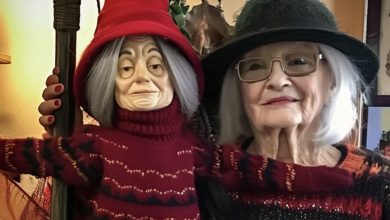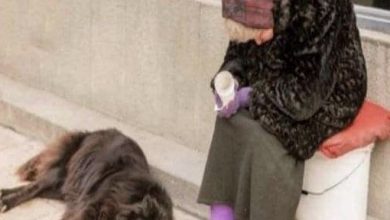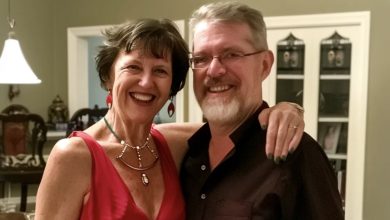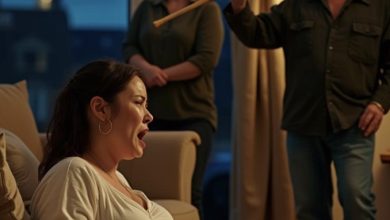“I Thought Strange Dreams Were a Sign of Madness—Until a Nurse Helped Me See the Truth”
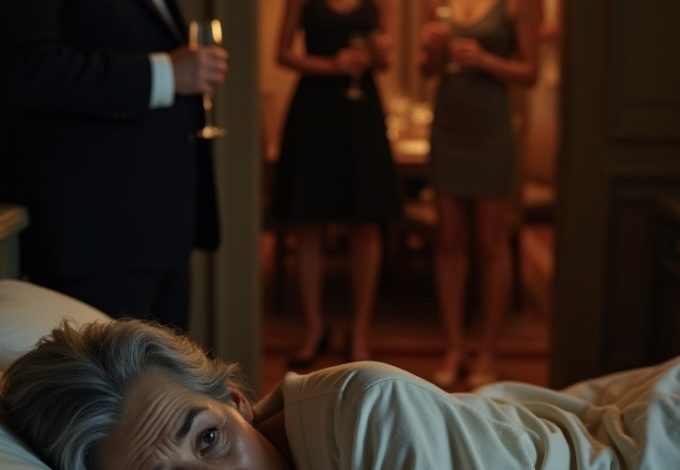
For twenty years, every single night, my husband William brought me a cup of what he called “calming tea.” He said it was good for me, that it would help me sleep deeply. And I believed him. I trusted him. But while my body grew heavy and weak, my mind never rested. Instead, I had strange visions—dreams of music and laughter, of parties echoing in my living room, the faint clinking of glasses, and the scent of perfume that was not mine.
When I told him about these dreams, he always gave me the same gentle smile. “Don’t worry, Nancy. It’s just the tea. That means it’s working.”
And slowly, I began to believe I was losing my mind.
The Beginning
My name is Nancy Oliver Smith, and I am seventy-seven years old. This is not just a story about betrayal. It is a story about waking up after decades of silence and learning what it means to reclaim your own life.
I grew up in a small town in Virginia, the kind of place where neighbors knew each other, where people left their doors unlocked, and where everyone thought secrets couldn’t last long. But secrets did last. Some were hidden for years, buried under trust and routine.
I met William when I was eighteen. He had just moved to our town, a pharmacist ten years older than me. He was intelligent, well-spoken, and carried himself with the calm confidence of someone who always knew what to say. My parents adored him. My father told me, “He’ll take care of you, Nancy. He’s a man with a good future.”
And so, in 1966, I became his wife. I still remember my wedding dress—simple white fabric embroidered with tiny flowers my mother had stitched by hand. When William said “I do”, his eyes were so intense that I thought it was overwhelming love. Only much later did I understand that look for what it was: control.
The early years of our marriage seemed ordinary. William ran the pharmacy, and I stayed home. We had no children, something that left an ache in my heart, but William always comforted me. “You and I are enough,” he would say. “We don’t need anyone else.” At the time, I believed him.
The Tea
Around our fifth anniversary, I began struggling with sleep. Some nights, I just couldn’t relax. William fussed over it far more than I did. “You can’t be happy if you don’t rest, Nancy,” he said, his concern almost theatrical.
One April evening in 1971, he came home with a solution. A special tea, he explained, blended from herbs he had selected himself. “Trust me, Nancy. I’m a pharmacist.”
The liquid was bitter, but he always added honey to mask the taste. At first, it was only on nights when I couldn’t sleep. Soon, he insisted I drink it every night at nine o’clock sharp. “Prevention is better than cure,” he would say, placing the cup in my hands. “All of it, my dear. To the last drop.”
The effect was heavy. My limbs would turn to lead, my eyelids thick, but my mind floated in a strange fog. I wasn’t really sleeping—I was trapped between sleep and waking. At first, I accepted it. After all, he was my husband. Surely he wanted what was best for me.
But then came the dreams.
The Strange Nights
At first, I heard muffled voices. Laughter. Music. The faint clink of glasses. I mentioned it to William the next morning. His answer was always the same: “Dreams, Nancy. Just vivid dreams from the tea. Nothing more.”
I tried to believe him. But the experiences became stronger. I would see flickering shadows. I would smell perfumes I had never owned. One night, I had the terrifying sense of being in the living room, unable to move, while William sat with a red-haired woman, their heads bent over photo albums, laughing quietly together.
When I told him, he shook his head with pity in his eyes. “Nancy, you were in bed all night. I checked on you. It worries me when you confuse dreams with reality.” Then he increased the strength of the tea.
Over time, I stopped trusting myself. Was I truly dreaming? Or was I awake? Friends drifted away. William explained to everyone that I was unwell, that my mind was fragile. My family received letters—letters I never wrote—saying I needed privacy. Slowly, I was cut off from the outside world, locked in a prison built from doubt and dependency.
By the time I was in my forties, I no longer questioned the tea. I simply drank it. And every night, I drifted into a twilight existence where I was both present and absent, half alive and half dreaming.
The Fall
It was June 1991. I was fifty-three years old. One morning, I woke up with a sharp pain in my hip. William told the doctor I had fallen during one of my “episodes.” I had no memory of it.
Dr. Parker, a family friend and William’s ally, told me gently, “You’ll need rest. Nothing serious.”
And so, I was admitted to the hospital. For the first time in twenty years, I spent nights without William’s tea.
The withdrawal was brutal. My body shook. I sweated through the sheets. My mind was restless, confused, but… clearer.
That’s when a nurse named Joy noticed. She was kind, with eyes that saw more than most people dared to.
On the third night, William came to visit. He carried the familiar porcelain teapot. “The staff here doesn’t know what you need like I do, Nancy,” he said, pouring the dark liquid.
After he left, Joy returned. She lowered her voice. “Your husband is very insistent about this tea. Mrs. Smith, remedies don’t usually cause this kind of dependence. It isn’t normal.”
Then she leaned closer, her whisper almost conspiratorial. “If you want, tonight I’ll pretend you drank it, but we’ll pour it away. Just once. Let’s see how you feel.”
Fear surged through me. Disobeying William felt dangerous. But in Joy’s eyes, I saw something I hadn’t seen in years—genuine concern. I nodded.
That night, I did not drink the tea. The next morning, the fog had thinned. The world looked sharper.
“How do you feel?” Joy asked.
“Like I’m finally waking up from a very long sleep,” I said quietly.
The Awakening
When I returned home, I began pretending. I accepted the cup each night, smiled, and even thanked William. But instead of drinking, I poured it into a plant by my chair. Then I pretended—the heavy eyes, the slow speech. I fooled him.
And while I pretended, I stayed awake.
That’s when I saw the truth.
William would check me, wave his hand in front of my face, then make a call. “She’s taken it. You can come.”
Soon, the red-haired woman arrived. Vivien. He kissed her at the door. They laughed, ate dinner at my table, drank wine in my living room. They spoke freely in front of me, convinced I was lost in my stupor.
One night, I heard them discuss their plan.
“When will we leave for Canada?” Vivien asked.
“Soon,” William replied. “The pharmacy is sold. We just need to finalize the Nancy situation.”
The Nancy situation. That’s what I had become.
They spoke of Dr. Parker preparing false reports about my mental decline. They discussed a psychiatric facility, guardianship papers, bank accounts. William would inherit control of everything.
I wasn’t just a wife to him. I was a financial obstacle to be removed.
Gathering Proof
When William went away on a short trip, leaving the neighbor to check on me, I acted. I searched his office.
Inside a locked drawer, I found files—false medical records describing me as mentally unstable, photos of me half-conscious labeled as “evidence.” I found his diary. Page after page described my “treatment,” the dosages, even payments to Dr. Parker.
And I found documents for a house in Canada, tickets, and financial transfers from the inheritance my parents had left me.
I copied everything, hiding it in an old coat.
The next day, I called my niece Jennifer, a lawyer in Richmond. “Jennifer, I need help. William has been drugging me for twenty years. He’s planning to commit me. I have proof.”
She was stunned. “I knew something was wrong. Hold on, Aunt Nancy. I’m coming for you.”
Freedom
Jennifer arrived the next day. Seeing me clear, awake, and steady, she knew the truth. She helped me sign papers, a protective order, and gathered the evidence.
When William returned, he walked straight into a trap. He was arrested trying to flee. Vivien was stopped at the Canadian border. Dr. Parker confessed to his part. William was sentenced to twelve years. He died in prison seven years later.
A New Life
But my story didn’t end with his punishment. At fifty-three, I was free but lost in a world that had moved forward without me. So I started over.
I went to college. I studied psychology, determined to understand how people could be broken—and how they could heal. At fifty-eight, I graduated. I opened a practice. I told my story to others who thought they were powerless. I created the Awakening Institute, a place for survivors of long-term psychological abuse.
The twenty years William stole from me weren’t wasted. I turned them into strength. Into purpose.
Today
My name is Nancy Oliver Smith, and I am seventy-seven years old. For two decades, I lived in a fog, drugged and betrayed by the man who vowed to love me. But the truth is this: I was never weak. I was surviving.
Now, I am awake. And I will never be silent again.

